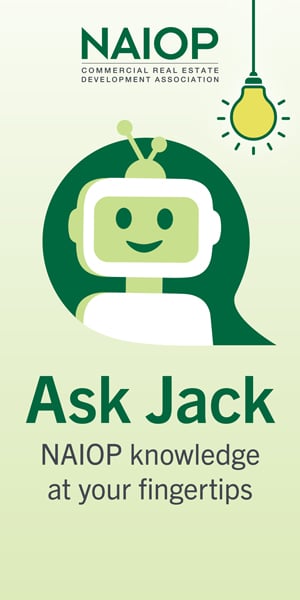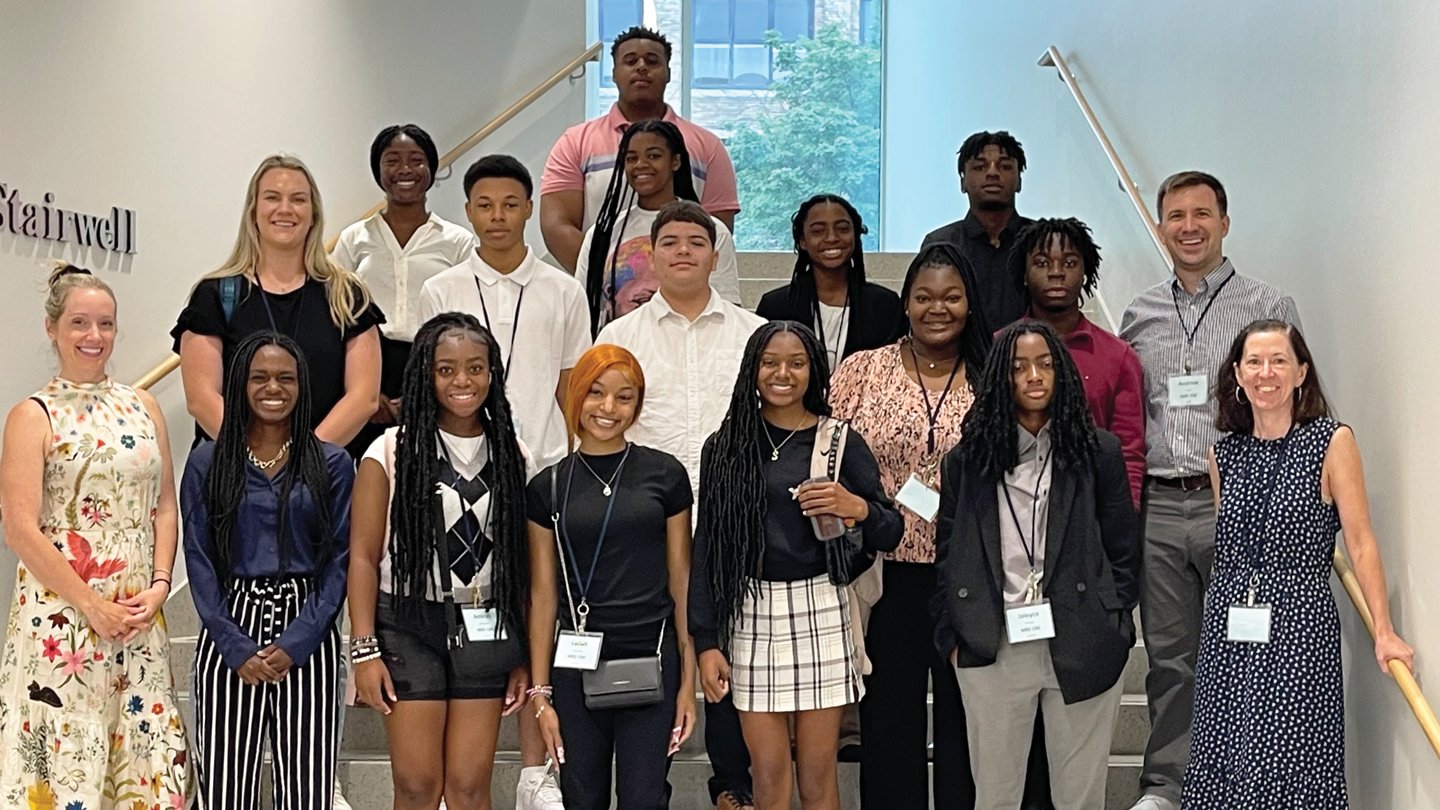
Immersing Students From Underrepresented Backgrounds in the Possibilities of CRE
A program partnership between Marquette’s Center for Real Estate, NAIOP Wisconsin and Physicians Realty Trust could serve to create a pipeline of diverse talent for the industry.
More than a dozen high school students spent the last week of a fleeting Milwaukee July the way one might expect: making new friends, exploring the city and taking in a baseball game. However, this group also did plenty of other things that don’t align with the typical 16-year-old’s summer, such as touring commercial real estate projects under construction and listening to panel discussions by bankers and developers.
At the MKE CRE Summer High School Immersion Program, all those experiences exist side by side.
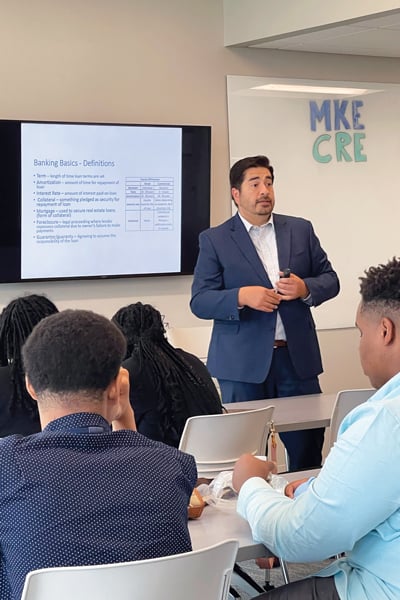
Ivan Gamboa, senior vice president of Tri City National Bank, teaches students about banking. Andy Hunt
“We want to help students to realize that commercial real estate is more than just a job or a course of study; it’s literally everywhere around them, shaping their neighborhoods and their lives,” said Andy Hunt, Vieth Director for the Center for Real Estate at Marquette University.
The intensive summer program, approaching its third year on Marquette’s campus and fourth overall, is a joint venture between the College of Business Administration’s Center for Real Estate (CRE) and the Wisconsin chapter of NAIOP.
Both organizations recruited diverse high school students from southeastern Wisconsin who were interested in real estate careers and provided them opportunities to learn from industry leaders through lectures, one-on-one mentoring and site visits. The program’s goal is to encourage students to make decisions about their futures while learning about designing, building, managing and selling properties.
Students applied for the camp in spring, and 20 were selected several months before attendance, with preference given to those entering their junior or senior year of high school. Several sponsors, including Physicians Realty Trust, the Mandel Group, Northwestern Mutual, Tri City National Bank and Hammes Partners, donate more than $30,000 per year to ensure the program remains accessible regardless of students’ socioeconomic backgrounds. NAIOP Wisconsin also helps raise funds to offset program costs.
“The community support in time, talent and treasure has been overwhelming,” Hunt said. “Milwaukee is a special city with special commercial real estate leaders.”
Michael Riopel, a NAIOP Research Foundation governor and a member of the Marquette CRE advisory board, brought the idea to Hunt in 2019 after seeing a similar collaboration between Drexel University and NAIOP’s Greater Philadelphia chapter. Hunt, who also serves on Marquette Business’ diversity, equity and inclusion committee, thought a youth camp would pair well with the college’s ongoing initiatives. After finding volunteers and sponsors, the first immersion program launched online in the summer of 2020, with Riopel, Hunt and NAIOP Wisconsin CEO Jim Villa as co-leaders.
Villa hopes the immersion program will create a pipeline of diverse talent for the industry. People from underrepresented backgrounds who want to work in commercial real estate often face structural barriers to entry, such as lack of access to affordable education or a professional network.
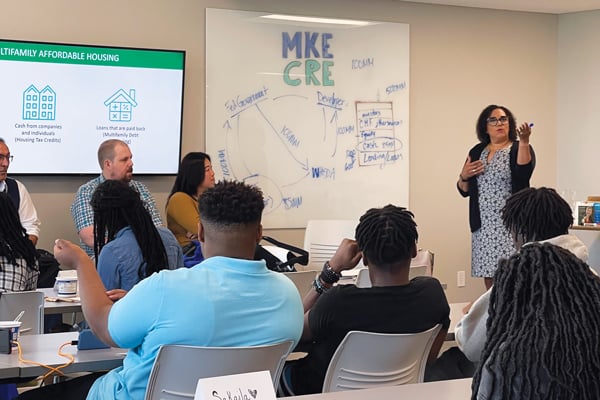
Students heard from multiple guest speakers throughout the week, broadening their understanding of key issues in commercial real estate. Andy Hunt
“At NAIOP, the diversification of real estate is incredibly important to us, not just in terms of real estate deals, but in terms of the people doing it,” Villa said. “The future of our communities depends on the people coming up in the industry who are going to make real estate development work for everybody. This program is a great chance to introduce the next generation of real estate leaders to different perspectives.”
Learning the Industry
Attendees spent a week on campus, staying overnight in campus residence halls under resident assistant supervision. Students often started the day listening to guest speakers talk about the construction process or how investment firms select properties to buy. After lunch, the cohort received in-person illustrations of the morning’s lecture with guided tours of new high-rise apartment buildings or downtown retail locations. Each day typically ended with dinner and group activities, such as a bowling night at the Union Sports Annex, an on-campus restaurant.
Jade Hendricks, assistant vice president of investor operations at MLG Capital in Brookfield, Wisconsin, saw herself when looking at the summer scholars. Hunt and Villa invited Hendricks to be a panelist in 2022, and she returned this past July. Students often met with Hendricks after her talk to ask additional questions, eagerly scribbling down the career advice she provided.
Hendricks admitted that she didn’t initially anticipate how much interest the students would have in real estate at their young age or the degree to which they would grasp advanced concepts despite being exposed to the industry for the first time only days before.
“I’m always surprised by what the students ask because they’re just so in tune with what you’re saying,” Hendricks shared. “I get questions like ‘Did learning about real estate help you manage your money?’ and ‘How do you contribute to your company?’ It’s always interesting to think about what their world is currently like and how they can try to visualize themselves in my shoes.”
Michael Emem, president and CEO of the Emem Group, also spoke to the group. The Emem Group’s extensive portfolio includes development in the predominantly African American neighborhoods of Harambee, King Park and Bronzeville in Milwaukee. His firm’s goal of building communities and promoting home ownership struck a chord with the immersion program campers.
“It’s important for young professionals to see other young professionals who look like them and who come from similar backgrounds because it’s a lot easier for them to relate and visualize themselves doing similar work,” Emem said.
In between guest speakers, George Cashman, the Marquette Business Robert B. Bell Sr. Chair in Real Estate, taught students commercial real estate basics such as banking and site development.
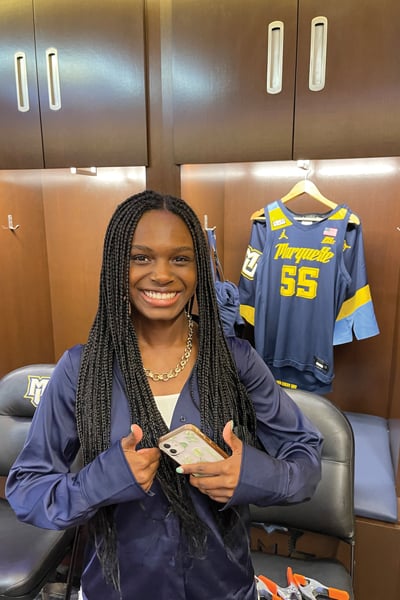
Campers got a look inside the Marquette basketball locker rooms at the Al McGuire Center, the campus athletics facility. Andy Hunt
“MKE CRE is the reason you go into teaching,” said Cashman, who is also a NAIOP Research Foundation Distinguished Fellow. “Watching the kids get excited about real estate, picking up the lingo and seeing the opportunities available is incredibly rewarding.”
Investing in the City
Physicians Realty Trust, a local company that invests in medical office buildings, was the immersion program’s title sponsor. Its involvement went beyond donations; the firm also invited the students to tour its offices in Milwaukee’s historic Third Ward neighborhood. Jen Manna, vice president and associate general counsel, and senior investment analyst Patrick McCoshen spent the week answering students’ questions and participating in activities with them, while Mark Theine, executive vice president of asset management, hosted a panel of young real estate professionals.
Companies that sponsor the program regard it as more than a charitable donation; they see it as an investment in their own industry’s future.
“We’re a Milwaukee-based company, and we believe in this city,” Manna said. “We think it’s so important for future leaders to take an interest in real estate because they’re going to be the ones shaping our city in the future.”
Hunt and Ivan Gamboa, senior vice president at Tri City National Bank, wanted to engage students through visits to recognizable landmarks around Milwaukee. Students toured Fiserv Forum, home of the NBA’s Milwaukee Bucks and Marquette basketball, and heard from arena personnel about the process of building and maintaining the $1.2 billion venue.
After visiting Fiserv, students took a trip next door to the Trade Hotel, a 207-room, nine-story Marriott Autograph Collection property that opened in May 2023. Both the stadium and the hotel are part of Deer District, a 30-acre mixed-use development neighborhood in downtown Milwaukee that gained national attention during the Bucks’ 2021 NBA championship season.
Prior to the MKE CRE camp, students might have viewed the neighborhood on television simply as the place where the Milwaukee Bucks play basketball. Afterward, it became a living example of how commercial development can transform a neighborhood for the better and a window into the kind of world the students could inhabit one day.
“A lot of these kids aren’t exposed to the same kinds of possibilities as their peers in different parts of the city,” Hunt said. “A lot of them never dreamed that they would be the ones to build places like Fiserv Forum or some of the other high-rises around the stadium. Then they meet the people who did it and, suddenly, it becomes possible. That’s what this camp is all about.”

Alumni from the MKE CRE Summer High School Immersion Program returned to campus to impart their wisdom to current students. Andrew Goldstein
The teenage students, not always easy to impress, saw value in the experience. “I love this camp because these people are giving out their financial advice for free,” camper Jasmine O. said.
Jaylen W. added, “My favorite part about this week was connecting with different people and getting tours around a bunch of places I’ve never been before.”
Diversifying the Talent Pool
As the only commercial real estate program to be housed within a Catholic, Jesuit university, Marquette’s nationally ranked Center for Real Estate abides by the idea of business with purpose, using sound principles, academics and ethics to positively influence its surrounding community. Hunt sees the summer immersion program and the Associates in Commercial Real Estate program (see feature box) as being in line with that mission, creating more opportunities in a field that does not have nearly enough minority representation.
“All of us in the Center for Real Estate decided a long time ago that diversifying the industry is important, and we wanted to do that in a way that aligns with Marquette’s mission. One of the university’s core values is cura personalis, or caring for the whole person, which calls us to create these growth opportunities whenever and wherever we can,” Hunt said.
“There are a lot of excellent candidates out there that aren’t getting identified because they didn’t get to go to the same school or have the same privileges that someone else had, but they’re just as capable and would be just as good of a fit at a commercial real estate company,” McCoshen said. “We view it as our job to work hard and identify those candidates.”
Although it will take a while for the high school-age scholars to mature into interns and entry-level job candidates, the MKE CRE program offers a more immediate benefit to companies that engage with it: information about city neighborhoods provided by the people who experience them every day.
“I like going to the immersion-week classes and listening to what the kids want to see in the city,” Gamboa said. “We should always go in with a mindset of what the next generation wants to do.”
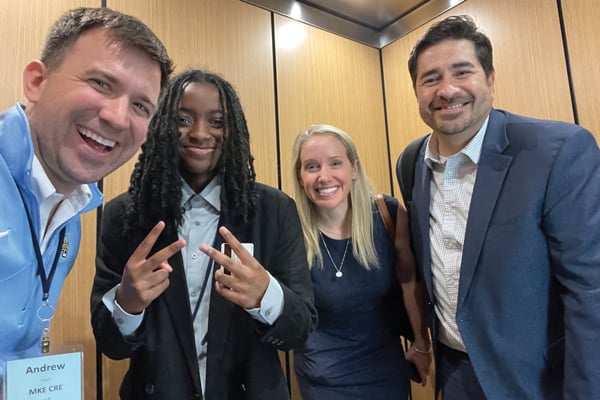
Vieth Director for the Center for Real Estate Andy Hunt (left) poses with a camper alongside Physicians Realty Trust Vice President and Associate General Counsel Jen Manna and Tri City National Bank Senior Vice President Ivan Gamboa. Andy Hunt
“You need to have diverse opinions and diverse backgrounds in a room to come to a really good solution to a problem,” Manna said.
Pursuing Lifelong Value
The summer immersion program concluded with students presenting their sole assignment for the week: a TikTok video demonstrating one thing they learned from their time at Marquette. Over the preceding days, students had gathered into groups and devised everything from dances to lip-syncs to summarize some of the lessons from the week’s speakers.
After friends and family finished enjoying the students’ creativity, Hunt and Villa addressed the room one final time, inviting the students to stay in touch. If they need advice, a reference or someone to make an introduction for them, it is just an email away.
“You were with us for one week, but we’ll always be with you,” Hunt told the crowd of students before they departed.
Although the immersion program has existed only since 2020, there are signs that students have taken Hunt’s message to heart. Students from the 2022 program came back for a reception to talk to the 2023 group, providing a start to what the program’s organizers hope will become an active immersion alumni network. Future program offerings may include an internship program during the school year.
Some students will go on to study commercial real estate in college, perhaps even at Marquette. Some will study business elsewhere. Many will pursue something outside of business altogether. Regardless, all of the participants are now aware of possibilities for their futures. They have gone from thinking of real estate as an abstraction to viewing it as a foundational part of their lives and communities.
Andrew Goldstein is a marketing communications associate with the Marquette University College of Business Administration.
Cultivating DEI in CREInviting students to campus in the summer is just part of the Center for Real Estate’s efforts to promote diversity, equity and inclusion in the industry. Marquette also partners with the Local Initiatives Support Corporation’s Milwaukee chapter on the Associates in Commercial Real Estate program, commonly referred to as ACRE. Over nine months, between 20 and 30 adult learners of color, ranging in age from 23 to 73, go through a professional development program that teaches them how to manage, invest in and develop real estate assets. Founded in 2004, ACRE has trained more than 300 aspiring commercial real estate professionals. ACRE helps solve one of the many ways that people of color are passed over for job opportunities: lack of connections. Many college business students complete at least one internship during their undergraduate career; nearly 90% of students in Marquette’s College of Business Administration do so, and more than 50% complete at least two. This often involves coordinating transportation to the internship site, setting aside time from classes and work-study programs, or even finding temporary housing — things that students with access to resources can do more readily. “At the heart of it, commercial real estate is a relationship business,” NAIOP Wisconsin CEO Jim Villa said. “What this program is doing is helping students establish relationships not only with themselves, but with professionals.” |
Relevant Research The NAIOP Research Foundation published “Diversity, Equity and Inclusion in Commercial Real Estate: Best Practices and Common Challenges” in September 2023. To download the report, visit dei-in-cre-2023.pdf. |
RELATED ARTICLES YOU MAY LIKE

Contractors Upbeat About Infrastructure but not Commercial Projects
Survey results also identify ongoing — though slightly improved — challenges with the supply chain.
Read More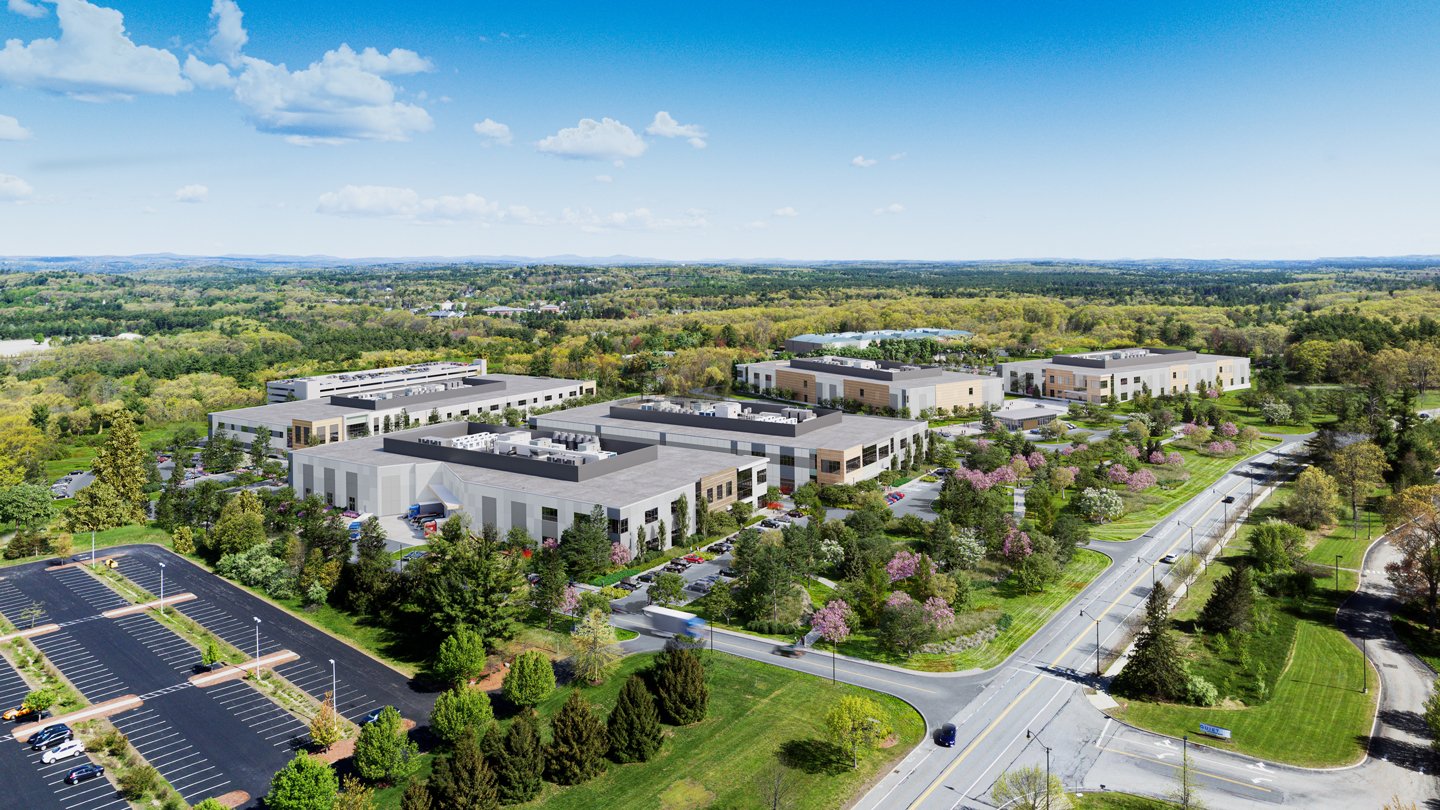
Forging the Future of North American Manufacturing
Report examines how reshoring and nearshoring are reshaping industrial real estate.
Read More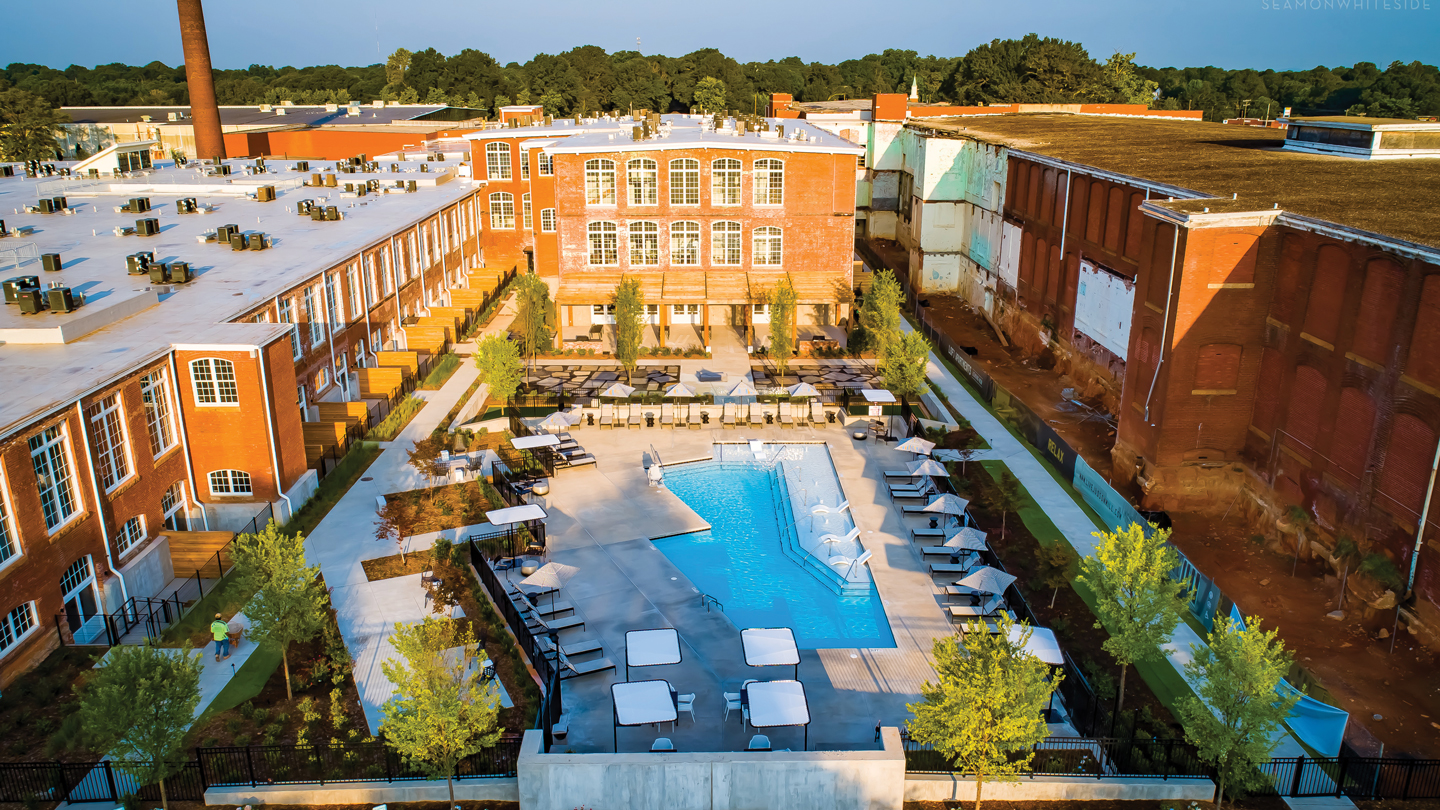
Transforming a Textile Mill Into a Vibrant Mixed-use Community
The Judson Mill District honors Greenville, South Carolina’s rich textile manufacturing history as it weaves a new plan for the future.
Read More

